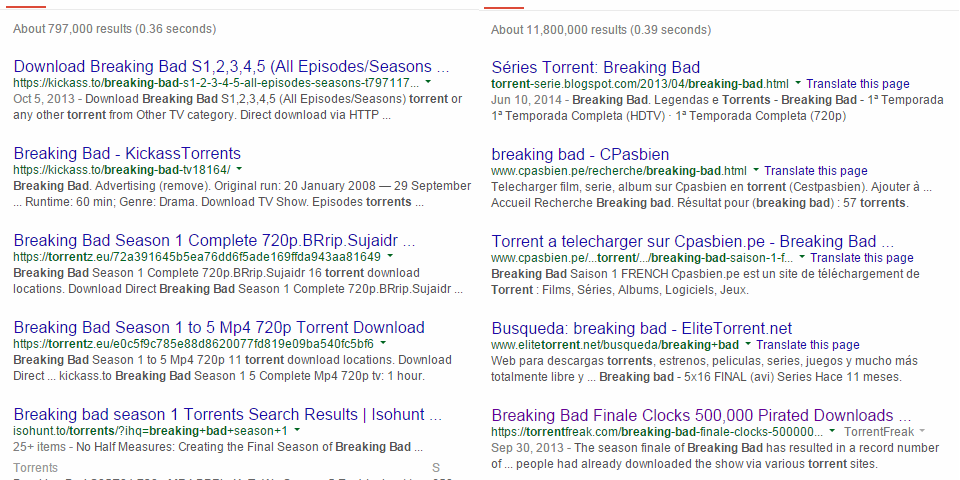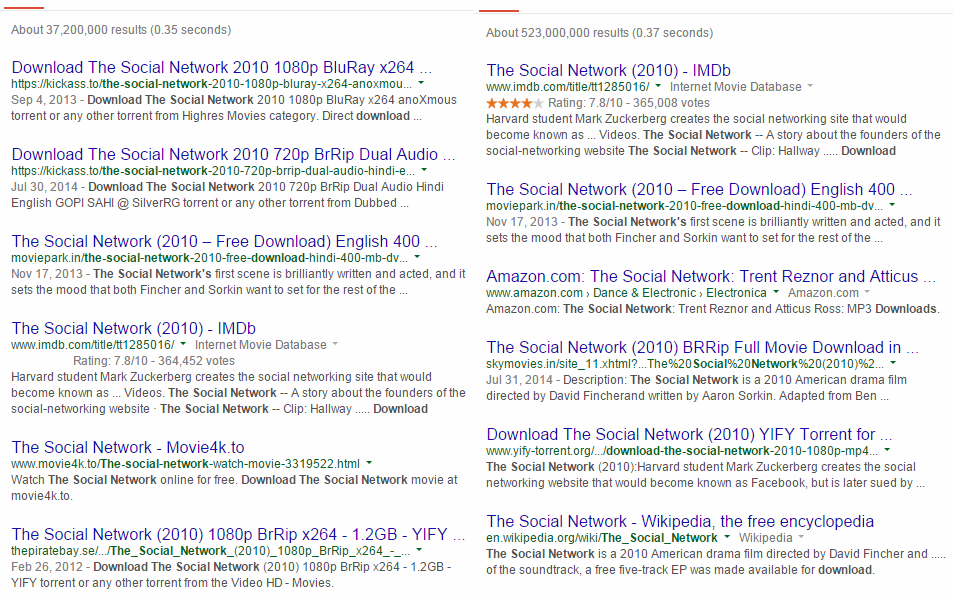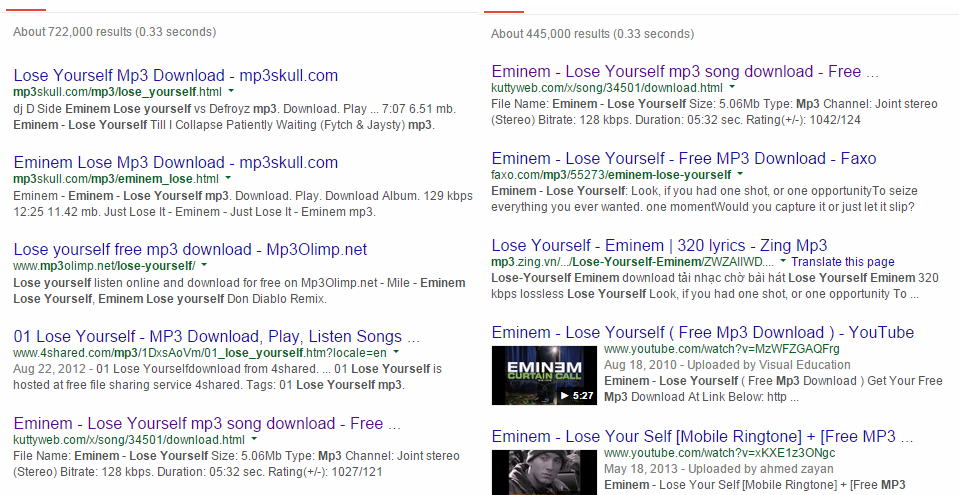[Most Recent Entries] [Calendar View]
Thursday, October 23rd, 2014
| Time | Event |
| 9:49a | Anti-Piracy Police PIPCU Secure Govt. Funding Until 2017
Since its official launch in September 2013 the unit has tackled online copyright infringement from a number of directions including arrests, domain seizures and advertising disruptions. PIPCU has shut down several sports streaming and ebook sites plus a large number of proxies. In June 2013 when the Department for Business, Innovation & Skills announced the creation of PIPCU, Viscount Younger of Leckie noted that the Intellectual Property Office would provide an initial £2.56 million in funding to the unit over two years. However, this funding was allocated on a temporary basis and was set to expire in 2015, a situation which prompted the Prime Minister’s former Intellectual Property Advisor Mike Weatherley to call for additional support. This morning the government confirmed that additional funding will indeed be made available to PIPCU enabling it to operate until at least 2017. Speaking to the national crime unit at the Anti-Counterfeiting Group Conference in London, Minister for Intellectual Property Baroness Neville-Rolfe said that PIPCU would be boosted by £3 million of funding from the public purse. “We’ve seen significant success in PIPCU’s first year of operation. This extra support will help the unit to build on this impressive record in the fight against intellectual property crime, which costs the UK at least £1.3 billion a year in lost profits and taxes,” Baroness Neville-Rolfe said. “With more money now being invested in ideas than factories or machinery in the UK, it is vital that we protect creators and consumers and the UK’s economic growth. Government and industry must work together to give long-term support to PIPCU, so that we can strengthen the UK’s response to the blight of piracy and counterfeiters.” City of London Police Commander Steve Head, who is the Police National Coordinator for Economic Crime, welcomed the cash injection. “The government committing to fund the Police Intellectual Property Crime Unit until 2017 is fantastic news for the City of London Police and the creative industries, and very bad news for those that seek to make capital through intellectual property crime,” Head said. “Since launching a year ago, PIPCU has quickly established itself as an integral part of the national response to a problem that is costing the UK more than a billion pounds a year. Much of this success is down to PIPCU moving away from traditional policing methods and embracing new and innovative tactics, to disrupt and dismantle criminal networks responsible for causing huge damages to legitimate businesses.” The news was also well received at music industry group BPI. “The work of PIPCU to date has been invaluable in tackling piracy, which is recognized as a significant threat to musicians’ income, investment in new businesses and the growth of the UK’s creative economy,” said Director of Copyright Protection, David Wood. “This funding demonstrates the commitment of the UK Government to promoting respect for intellectual property, which acts as the backbone of growth for our world-leading creative and digital media sectors.” PIPCU, which is closely allied with the Intellectual Property Office (IPO), is a 21-strong team comprised of detectives, investigators, analysts, researchers, an education officer and a communications officer. The unit also reports two secondees – a Senior Intelligence Officer from the IPO and an Internet Investigator from the BPI. The latter role was previously filled by the BPI’s Mark Rampton but according to his Linkedin profile he left his position last month. No announcement has been made detailing his replacement. While PIPCU is definitely leaving its mark, not all operations have gone to plan. In one of its highest-profile actions to date, last month the unit shut down what it described as an illegal and “industrial scale” sports streaming service in Manchester. However, in mid October all charges were dropped against its alleged operator. Source: TorrentFreak, for the latest info on copyright, file-sharing and anonymous VPN services. |
| 1:34p | Record Labels Obtain Order to Block 21 Torrent Sites
Last week these rightsholders were joined by luxury brand owner Richemont, which successfully obtained orders to block sites selling counterfeit products. The outcome of that particular case had delayed decisions in other blocking applications, including one put forward by the record labels. Today the High Court ended its hiatus by processing a new injunction. The application was made by record labels 1967, Dramatico Entertainment, Infectious Music, Liberation Music, Simco Limited, Sony Music and Universal Music. The labels represented themselves plus the BPI (British Recorded Music Industry) and PPL (Phonographic Performance Ltd) which together account for around 99% of all music legally available in the UK today. Through their legal action the labels hoped to disrupt the activities of sites and services they believe to be enabling and facilitating the unlawful distribution of their copyright works. In this case the key targets were the 21 torrent sites listed below:
As usual the UK’s leading Internet service providers – Sky, Virgin, TalkTalk, BT and EE – were named as defendants in the case. The ISPs neither consented to nor opposed the application but participated in order to negotiate the wording of any order granted. In his ruling Justice Arnold noted that the sites listed in the application function in a broadly similar way to The Pirate Bay and KickassTorrents, sites that are already subjected to blocking orders. Perhaps surprisingly, efforts by some of the sites to cooperate with rightsholders meant little to the Court. “All of [the sites] go to considerable lengths to facilitate and promote the downloading of torrent files, and hence infringing content, by their users,” Justice Arnold wrote. “Although a few of the Target Websites pay lipservice to copyright protection, in reality they all flout it. Although a few of the Target Websites claim not to, they all have control over which torrent files they index.” Also of interest is that Court didn’t differentiate between sites that allow users to upload torrents, those that store them, or those that simply harvest links to torrents hosted elsewhere. “Thirteen of the Target Websites (bittorrent.am, btdigg.org, btloft.com, nowtorrents.com, picktorrent.com, torrentdb.li, torrentdownload.ws, torrentexpress.net, torrentproject.com, torrentroom.com, torrentus.eu, torrentz.cd and vitorrent.org) do not permit uploads of torrent files by users, but gather all their links to torrent files using ‘crawling’ technology. No torrent files are stored on these websites’ own servers,” Justice Arnold explained. “Nevertheless, the way in which the torrent files (or rather the links thereto) are presented, and the underlying technology, is essentially the same as in the cases of the other Target Websites.” The Judge also touched on the efficacy of website blockades, citing comScore data which suggests that, on average, the number of UK visitors to already blocked BitTorrent sites has declined by 87%. “No doubt some of these users are using circumvention measures which are not reflected in the comScore data, but for the reasons given elsewhere it seems clear that not all users do this,” Justice Arnold wrote.
“Illegal sites dupe consumers and deny artists a fair reward for their work. The online black market stifles investment in new British music, holds back the growth of innovative legal services like Spotify and destroys jobs across Britain’s vital creative sector,” Taylor said. “Sites such as these also commonly distribute viruses, malware and other unsafe or inappropriate content. These blocks will not only make the internet a safer place for music fans, they will help make sure there is more great British music in years to come.” Finally, and mirroring a decision made in the Richemont case, Justice Arnold said that Internet subscribers affected by the block will be given the ability to apply to the High Court to discharge or vary the orders. Furthermore, when blocked site information pages are viewed by ISP subscribers in future, additional information will have to be displayed including details of the parties who obtained the block. Source: TorrentFreak, for the latest info on copyright, file-sharing and anonymous VPN services. |
| 7:29p | Google’s New Search Downranking Hits Torrent Sites Hard
One of the suggestions often made is the removal or demotion of pirate sites in search results. A lower ranking would lead fewer people to pirate sources and promoting legal sources would have a similar effect, rightsholders argue. While Google already began changing the ranking of sites based on DMCA complaints in 2012, it announced more far-reaching demotion measures last week. According to Google the new alghorithm changes would “visibly” lower the search rankings of the most notorious pirate sites, and they were right. TorrentFreak has spoken with various torrent site owners who confirm that traffic from Google has been severely impacted by the recent algorithm changes. “Earlier this week all search traffic dropped in half,” the Isohunt.to team told us. The drop is illustrated by a day-to-day traffic comparison before and after the changes were implemented, as shown below. The graph shows a significant loss in traffic which Isohunt.to solely attributes to Google’s recent changes.  The downranking affects all sites that have a relatively high percentage of DMCA takedown requests. When Google users search for popular movie, music or software titles in combination with terms such as “download,” “watch” and “torrent”, these sites are demoted. The new measures appear to be far more effective than previous search algorithm changes, and affect all major ‘pirate’ sites. Below is an overview of the SEO visibility of several large torrent sites in the UK and US, based on a list of 100 keywords.  The true impact varies from site to site, depending on how much it relies on Google traffic. Confirming their earlier stance, The Pirate Bay team told TorrentFreak that they are not really concerned about the changes as they have relatively little traffic from Google. “That Google is putting our links lower is in a way a good thing for us. We’ll get more direct traffic when people don’t get the expected search result when using Google, since they will go directly to TPB,” they said. To get an idea of how the search results have changed we monitored a few search phrases that were likely to be affected. The before and after comparisons, which are only three days apart, show that popular ‘pirate sites’ have indeed disappeared. A search for “Breaking Bad torrent” previously featured Kickass.to, Torrentz.eu and Isohunt.com on top, but these have all disappeared. Interestingly, in some cases their place has been taken by other less popular torrent sites.  The top torrent sites have also vanished from a search for the movie The Social Network. “The Social Network download” no longer shows results from Kickass.to, ThePirateBay.se and Movie4k.to but shows the IMDb profile on top instead.  Searches for music tracks have changed as well. The phrase “Eminem lose yourself mp3″ no longer shows links to popular MP3 download sites such as MP3Skull.com, but points to legal sources and lesser known pirate sites.  The traffic data and search comparisons clearly show that Google’s latest downranking changes can have a severe impact on popular “pirate” sites. Ironically, the changes will also drive a lot of traffic to smaller unauthorized sources for the time being, but these will also be demoted as their takedown notice count increases. Rinse and repeat. Source: TorrentFreak, for the latest info on copyright, file-sharing and anonymous VPN services. |
| << Previous Day |
2014/10/23 [Calendar] |
Next Day >> |
 In a relatively short space of time City of London Police’s Intellectual Property Crime Unit has stamped its mark on the online piracy space in a way few other organizations have managed.
In a relatively short space of time City of London Police’s Intellectual Property Crime Unit has stamped its mark on the online piracy space in a way few other organizations have managed.

